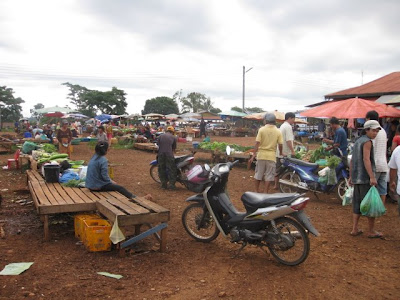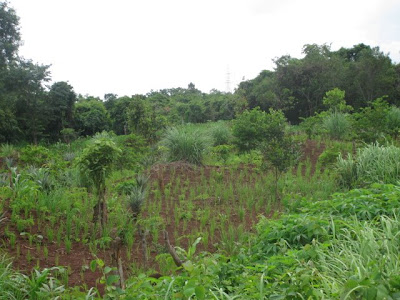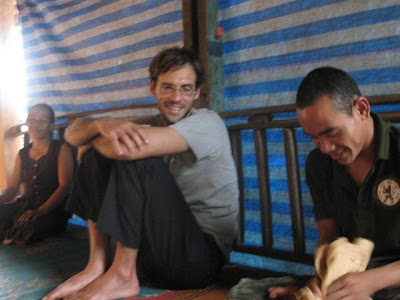



 I've been eating mostly an organic diet since the farmers in this area don't use pesticides and only some use synthetic fertilizers. None of this stuff is GMO either. The local meat - chickens on the school site which are allowed to naturally forage, as well as beef which naturally grazes on grass - is not fed corn (or other cows - dead stock as it's called) as most livestock is fed in Canada. Great. At the market we buy salt, chilis, fruits, vegetables, fish, and of course...
I've been eating mostly an organic diet since the farmers in this area don't use pesticides and only some use synthetic fertilizers. None of this stuff is GMO either. The local meat - chickens on the school site which are allowed to naturally forage, as well as beef which naturally grazes on grass - is not fed corn (or other cows - dead stock as it's called) as most livestock is fed in Canada. Great. At the market we buy salt, chilis, fruits, vegetables, fish, and of course...MSG! (Gong holding up a sample)


 In the market: one motorbike, three little kids, one dad, no helmets, no fears, no one telling him to do otherwise.
In the market: one motorbike, three little kids, one dad, no helmets, no fears, no one telling him to do otherwise. 


 Polycultures keeps the soil healthier, prevents pests (and therefore reduces the need for pesticides), and provides the farmers with food they don't have to buy...which makes total economic sense for subsistence farming. This method is much more ecologically and economically sustainable than the methods used in the majority of the West, a large part of Laos, and in large parts of other developing nations. One of the goals of So and Ramsey's school is to promote the idea that the traditional Lao knowledge, methods and practices of farming are valuable, and should be maintained instead of "progressing" to more industrial agriculture. A big misconception is the idea that slash and burn agriculture is harmful.
Polycultures keeps the soil healthier, prevents pests (and therefore reduces the need for pesticides), and provides the farmers with food they don't have to buy...which makes total economic sense for subsistence farming. This method is much more ecologically and economically sustainable than the methods used in the majority of the West, a large part of Laos, and in large parts of other developing nations. One of the goals of So and Ramsey's school is to promote the idea that the traditional Lao knowledge, methods and practices of farming are valuable, and should be maintained instead of "progressing" to more industrial agriculture. A big misconception is the idea that slash and burn agriculture is harmful.Ramsey points out (actually types out) that "Slash and burn is often the only sustainable land use option for small scale farmers dealing with the compounded pressures of increased weed infestation and declining soil fertility. When used in a planned rotational system, slash and burn can actually increase biodiversity by multiplying the number of ecotones in a region. Farmers rarely slash large forested areas near their villages, which they maintain for food sources such as animals and mushrooms, fuel wood and religious activities. This is why, despite slash and burn being the dominant form of agriculture in Laos' mountainous areas, these areas have remained over half primary forest cover until just a decade or two ago. The rotational system guarantees that by the time the farmer returns to a previously slashed area, the soil fertility has replenished itself during the fallow period and the weed seeds that had proliferated during the opening of the land have all disappeared from the regenerated system's soil. Industry and governments push reforestation as an environmental alternative to slash and burn but their reasons are primarily that of profit. By invalidating the local form of knowledge and displacing the local peoples from their land and context, industries can set up massive eucalyptus, rubber, acacia and other tropical forest trees all intended as cash crops. The villagers are often converted from being independent stewards of a complex and fascinating landscape into workers of multinational pulp and paper or auto part industries. What's more, through faultily conceived measures to combat global warming, such initiatives are often subsidized by "carbon offsets" and "carbon trading" measures that define these massive land use conversions as "reforestation of degraded lands"."
I was intending to calculate the carbon footprint of my trip - air travel, bus, train, tuk tuk etc. - and then buy carbon offsets for it. But I'll have to really look into some of these offset companies and make sure that they aren't "reforesting" by taking away polycultures and planting vast monocultures of rubber plants. In fact a better way to offset would be to support any organization that I know is doing good works for the environment. Haha...donating to Ramsey some more? I see his plan - sneaky.
Gong has been practicing his English with me. On the motorbike ride back he asks me to sing a song for him in English. I tell him I will only do so if he sings one in Laos. He says okay and that he likes to sing. I usually have a problem singing solo in front of people, but this time I do it easily since the wind and the motorbike engine takes away half my voice and Gong is faced away from me. Summertime, The Rainbow Connection, a song from Oh Brother Where Art Thou, a lullaby and four Lao songs later, we find ourselves back at the school. Good times.
As I walk along the path of the school I see evidence of barefooted children having recently passed through. They have probably gone to the river to play and bathe. I come back to find So and Ramsey preparing food in their nightclothes in the kitchen. This informality is a luxury until the students come back this evening.


After lunch we go to visit Compeng at her house. Compeng is a student at the school as well as Gong's girlfriend (most likely future wife) - they have never even held hands. She's been feeling ill for about a month. The Lao are a very superstitious people and believe in spirits and ghosts (their form of animism), as well as Buddhism. Compeng's family thinks that there is a ghost that wants to marry her, so it is making her sick in order to hasten her transition into the afterlife so that it can be with her. Recently she's been feeling better and will come back to school tomorrow.
At her home, we are greeted by Compeng, her mother, grandmother and aunt. We all sit on the floor. Her grandmother is a hunched, thin, tiny woman of a hundred and one years of age.

Compeng's family grows custard apples, logan, bananas, tamarind, coconuts and many more crops around their house. They present us with delicious logan and my new favourite fruit...custard apples!
The custard apple taste can't be described. It is about the size of a fist and the outside has large bumps and is sea foam green in colour. It is full of compartments of the palest yellow fruit flesh which enshroud large shiny black seeds. It is a pleasure to eat, not just because of its delicate and fragrant taste, but because the extraction of the flesh from the seeds is quite orally tactile as well as time consuming. This draws out the enjoyment. I eat two large custard apples (bigger than my fist) while everyone eats only one. Though I am genuinely encouraged to have as much as I want, I feel like I have to explain to the family that I can't get these in Canada, at least not fresh off the tree, so I have to eat it while I can. Seeing my appetite for their offering, they come out with more...it's a bit embarrassing. I can't eat any more, but I am told to take one with me which I happily do. I am relishing eating this delight tomorrow morning!
 At some point I tell them that Gong has a beautiful voice and should sing to Compeng to make her feel better. Gong doesn't want to but I offer to sing them something first to encourage Gong to sing. Big Mistake. With everyone watching me, and no wind to muffle my voice, I suddenly feel a performance anxiety creep over me and I take forever to be able to sing. I have a few fits and starts, my throat dries up and I have to take water, I begin to heat up and sweat, and I keep on coughing and laughing nervously. Eventually I am able to squeak out the song So wants me to sing the most...Summertime...it sounds strained and thin to my ears and I don't like my rendition, but they seem to receive it alright. It's now Gong's turn and I think my psyche-out has kinda rubbed off on him. He is also unable to sing, also coughs and takes water, begins to sweat, turns red and looks truly uncomfortable. Eventually he sings - it is met with loud applause by all. There are long moments of silence between conversations among the guests and family, yet there doesn't seem to be any tension or pressure to fill the silence. I've noticed this among the students as well. It is a refreshing change.
At some point I tell them that Gong has a beautiful voice and should sing to Compeng to make her feel better. Gong doesn't want to but I offer to sing them something first to encourage Gong to sing. Big Mistake. With everyone watching me, and no wind to muffle my voice, I suddenly feel a performance anxiety creep over me and I take forever to be able to sing. I have a few fits and starts, my throat dries up and I have to take water, I begin to heat up and sweat, and I keep on coughing and laughing nervously. Eventually I am able to squeak out the song So wants me to sing the most...Summertime...it sounds strained and thin to my ears and I don't like my rendition, but they seem to receive it alright. It's now Gong's turn and I think my psyche-out has kinda rubbed off on him. He is also unable to sing, also coughs and takes water, begins to sweat, turns red and looks truly uncomfortable. Eventually he sings - it is met with loud applause by all. There are long moments of silence between conversations among the guests and family, yet there doesn't seem to be any tension or pressure to fill the silence. I've noticed this among the students as well. It is a refreshing change.  After a while, we say our goodbyes and crouch out of the house...you must always crouch when walking by someone older...in this case the grandmother is sitting near the stairs. We go back to the school and all decide to forego dinner since we are so full of fruit.
After a while, we say our goodbyes and crouch out of the house...you must always crouch when walking by someone older...in this case the grandmother is sitting near the stairs. We go back to the school and all decide to forego dinner since we are so full of fruit. 



 I decide to make it more interactive by getting us all into a big circle and getting each student to contribute a dance move that the other students would have to imitate. This goes quite well and some hilarity ensues. I am quite impressed with some of their dance moves - they are more creative, suaver and braver than their shy demeanor would have me initially believe. I am surprised by how sexualized some of the moves are. It's all that pent up sexual energy. At the end I teach them a team cheer, with everyone's hands in the middle and then yelling "Go team!" as their hands fly up into the air.
I decide to make it more interactive by getting us all into a big circle and getting each student to contribute a dance move that the other students would have to imitate. This goes quite well and some hilarity ensues. I am quite impressed with some of their dance moves - they are more creative, suaver and braver than their shy demeanor would have me initially believe. I am surprised by how sexualized some of the moves are. It's all that pent up sexual energy. At the end I teach them a team cheer, with everyone's hands in the middle and then yelling "Go team!" as their hands fly up into the air.







 Ice...consider yourself broken.
Ice...consider yourself broken.

 School
School View of the Stream from the School
View of the Stream from the School  Well
Well Solar Panels
Solar Panels Flora - pretty yellow flowers, and a papaya tree!
Flora - pretty yellow flowers, and a papaya tree! 







 Scenery from tuk tuk.
Scenery from tuk tuk. We arrive at the school late as the sun is just about set, so I don't get a good look at the place. Some of Ramsey's students come out to quickly greet us and help us with our bags. I don't get a formal introduction since we are all tired. Ramsey told me earlier that the students are usually gregarious and natural with him and So because they are used to them, however, they will be very shy with me and this will cause a new extended shyness towards Ramsey since I am his (foreign) friend. He said I will have to do something quickly about that so that they will feel at ease with me, and (more importantly) him again...but right now I am too weary to worry about that - tomorrow I will cross that bridge.
We arrive at the school late as the sun is just about set, so I don't get a good look at the place. Some of Ramsey's students come out to quickly greet us and help us with our bags. I don't get a formal introduction since we are all tired. Ramsey told me earlier that the students are usually gregarious and natural with him and So because they are used to them, however, they will be very shy with me and this will cause a new extended shyness towards Ramsey since I am his (foreign) friend. He said I will have to do something quickly about that so that they will feel at ease with me, and (more importantly) him again...but right now I am too weary to worry about that - tomorrow I will cross that bridge.
